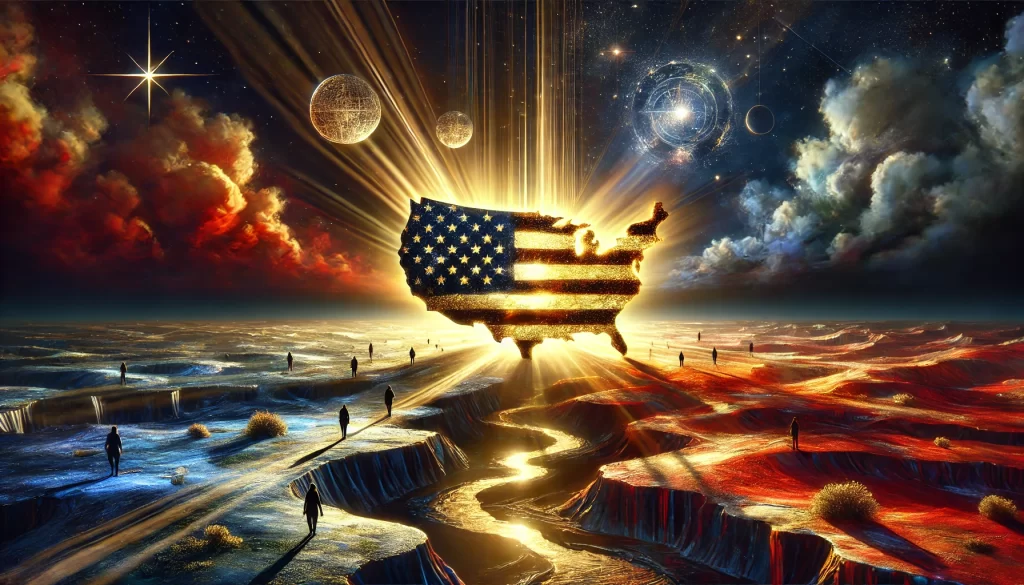
Almost everyone has an issue with the United States.
And almost everyone either lives there, wants to move there, or quietly wonders if they should have. This contradiction doesn’t need correcting — it needs understanding.
We criticize what affects us. And the United States affects everything. It is oversized in our imagination, loud in our headlines, and omnipresent in our daily lives — from the software we use to the stories we tell ourselves about success, identity, and freedom. The U.S. has long functioned not just as a nation-state but as a global mood board, with a reach that extends far beyond its borders and a narrative that gets woven — sometimes forcefully — into the lives of people who’ve never stepped foot on its soil.
So it’s no wonder there’s tension. The U.S. is the world’s most scrutinized country, and rightly so. It exports culture and control in equal measure. It has military bases on almost every continent, CEOs in every boardroom, and content on every screen. Its policies influence food prices in Africa, immigration law in Europe, environmental strategy in Asia. And yet, despite the frustration and fatigue, it remains an undeniable draw. That’s the contradiction we’re living through: the uneasy truth that the place so many people protest is also the place they still aspire toward.
That’s not hypocrisy — it’s a story about gravity. Power attracts and provokes. The U.S. isn’t desirable because it’s perfect. It’s desirable because it’s powerful, and in a deeply unequal world, proximity to power often looks like a path to possibility.
The critique, then, is not of the American people, or even always of American values. It’s often a critique of how power operates. And yet, within that flawed system, America has repeatedly offered something that many other countries struggle to provide at scale: the infrastructure to dream, the freedom to dissent, and the possibility — however narrow — of reinvention.
It’s messy, sometimes dangerous, often deeply unfair. But it’s also, to many, more navigable than their own countries’ versions of injustice. So people come. Or try to. Or wish they could. The volume of the criticism is often matched by the volume of visa applications.
I studied in the U.S. I loved the people and my experience. I have great memories. I respected the U.S. a lot, and I still do. I often used to get asked for my opinion, and I find myself sharing that opinion a lot more these days. The U.S. was fascinating in many, many ways, and I had an experience that I hold dear.
Somewhere in this friction is a truth we often miss: people don’t move to countries because they like them. They move because they need to. Because they’re chasing leverage, not love. For many, the United States isn’t a beacon of hope — it’s a bet. A calculated, often reluctant wager that being inside the empire is safer, or more fruitful, than being on its edges.
And part of the reason the U.S. continues to pull people in is that, compared to much of the world, it still offers a combination of ingredients that are hard to find elsewhere. Institutions that (mostly) work. A legal system that (mostly) protects. The scale and openness of the market. A culture that tolerates ambition, rewards initiative, and often forgives failure. Many countries are safer, or more equal, or less chaotic — but few offer all of that and the upside that the U.S. does.
There’s a difference between aspiration and affection. The U.S. doesn’t need to be loved to be longed for. And even its loudest critics, from the inside and outside, are often fighting for it to live up to its ideals — not to discard them. The dream may be dented, but it hasn’t been deleted.
And then there’s the storytelling. No country has mastered the art of self-narrative quite like the United States. It sells you the underdog myth even when it’s the overlord. It wraps brutality in branding. It markets reinvention as a native right. It tells the world: you can be anything here. Even if, in reality, many can’t. But that promise — that illusion of mobility — is more than most countries offer. In some places, your caste, your passport, your last name, or your political views are lifetime sentences. In America, those things might slow you down, might even break you — but they don’t always lock you out.
And yes, the system is tired. Frayed. In parts, utterly broken. The inequality is staggering, the politics maddening, and the violence deeply unsettling. But the paradox endures. The very things that make people skeptical of the U.S. are also what draw them in: its openness to conflict, to contradiction, to change. Its refusal to hide its wounds. Its tendency to break and rebuild, again and again, often at great cost.
If anything, the global obsession with the U.S. is a mirror reflecting not just what America is, but what the rest of us are lacking. We can’t talk about the gravity of America without confronting the weakness of the alternatives. For all the deserved criticism, where else is there? Many countries want to compete with America, but few are willing to be as vulnerable, as chaotic, or as accommodating of outsiders. It’s not that America is exceptional. It’s that the rest of the world still feels, in many ways, unready.
So we keep circling. Praising and protesting. Admiring and resenting. And all the while, the U.S. remains — flawed, complicated, impossible to ignore. You don’t have to love it. But if you’re serious about what opportunity looks like in a broken world, you do have to reckon with it. Because like it or not, it’s still the stage where much of the world’s drama plays out.
And for now, everyone still wants a seat.